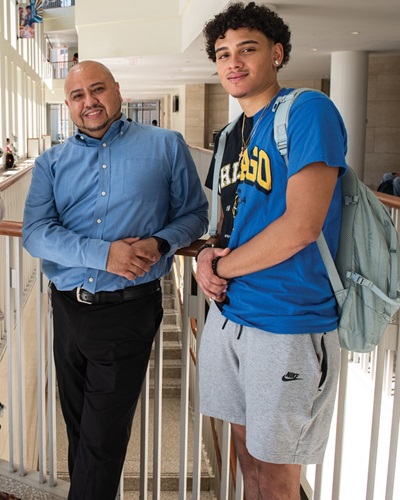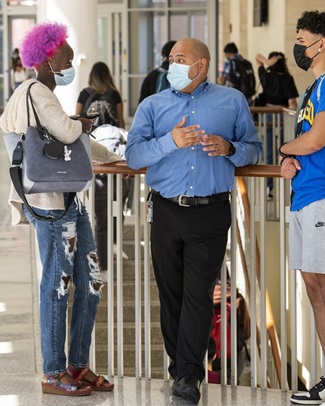EDUCATION EQUITY IN ACTION: SUCCESS BOSTON
Joél Mora
Assistant Director, Student Success Programs, UMass Boston
HOW LONG HAVE YOU BEEN A SUCCESS BOSTON COACH?
I’ve been a coach for 11 years. I started in 2010 and have coached more than 300 students. It’s been quite a journey.
WERE YOU THE FIRST IN YOUR FAMILY TO GO TO COLLEGE? LOTS OF SUCCESS BOSTON COACHES HAVE THAT BACKGROUND.
Yes, I was the first to go to college and succeed.
SO, YOU’VE PROBABLY ENCOUNTERED A LOT OF THE ISSUES THAT THE STUDENTS YOU’RE COACHING HAVE.
Yes. It has made the students more comfortable working with me because we have many similar experiences and backgrounds. Having a similar background and similar cultural tastes in food and music… It has made the students really feel at ease when it comes to coaching. And I think the most important element of coaching is getting the students to feel comfortable with me.
SPEAK ABOUT NELFI.
He’s great. When I reached out to him by phone to say that I was assigned to work with him, he immediately said, “That sounds good.” We made an appointment to meet here on campus. He’s a tall, curly-haired gentleman. We start with the logistical things and then we talk about how Success Boston works. I could see the lightbulb turn on in his head when he realized that I could really help him. That was the beginning of our relationship. Then I gave him my cell number and told him that this was how he could reach me and we would find a way to meet up. So, we talked about once or twice a month, which was great because he had questions and every time I was on campus, he would make an effort to see me, sometimes just to say “What’s up?” That showed me how important it was to be on campus. He really understands that I’m going to be here to support him through this. Those are great times for me, as a coach, because they show they really understand why I’m here. It gets to the point where they ask how my kids are doing. And that’s when you really know you’re getting it right.
Nelfi has been very consistent. He responded when I asked for student speakers to talk to high school kids about Success Boston. He stepped up by representing UMass Boston. He shared his experience at UMass and what he went through. He was one of the highlights of my efforts to reach youth through Hyde Square Task Force.
USING NELFI AS AN EXAMPLE, HOW DO YOU START OUT WITH A STUDENT AND THEN HOW DOES THE RELATIONSHIP DEVELOP?
There are two parts to it—the in-person and the virtual experience. For the last 10 years, before the pandemic, I made an effort to meet my students in person on their campus. And so, I organized my cohort of students by where they were going to school and put them in buckets, knowing that I would have a large contingent of students attending UMass Boston, Bunker Hill Community College or BFIT (Benjamin Franklin Institute of Technology). I have some students attending Northeastern or Boston University, places that are close by and easy to travel to, which makes it easier for me to coach them.
So, I make an effort to meet with students in the summer, and those interactions are key. For the rest of the students, I make an effort to meet with them at least once a semester. With an individual like Nelfi, he has access to my phone number so that we can text or chat or schedule a time to meet up.
My goal as a coach is to accommodate the needs of the students to make it comfortable for them to be coached. There is no secret sauce. You just need to be able to tell when a student isn’t up to talking about school and all you need to do is check on them and know that they’re doing well. One thing I rely on is humor. I like to make my students laugh and smile because the world of college can be a serious thing for many students and for others it can be painful. So, if I can add an element of humor into our conversation or our interaction, I think it makes them remember it in the best possible way. I’ve always gone a little above and beyond for all my students. I know their time is limited and they’re very busy.
You just have to be very responsive and really listen to what your students are saying.
HE MENTIONED THAT HE CONSIDERED STOPPING OUT. WAS THAT TRUE OF OTHER STUDENTS? LATINO MALES HAVE THE MOST DIFFICULTY IN COLLEGE AND ESPECIALLY COMPLETING COLLEGE. WHAT FACTORS LEAD TO THAT?
Many of the students I work with are young Latino men. The challenges they face—even the challenges I faced when I was in college—pressures at home from family is a major one. The young man is supposed to assume the next role in the family to succeed the father. And that’s a lot of pressure for a young man to deal with at home. And then, on top of that, their environment and the peers they associate with could also be an influencing factor. Latino young men don’t feel that they can be at the level of their peers who are White or Asian or Black. They feel that they are limited with their second language. They’re not realizing that their second language is a strength!
For some young men who are new to this country, that is a big challenge. But for some who have been here for a while, that fluidity of being able to speak English and Spanish very easily can be a stumbling block for them. They get discouraged quickly when they don’t understand something and then they automatically flip the switch and think, “I’m not going to be able to do this.”
So, I message the fact that being bilingual is a great advantage in life. It’s important to message that. I try to bring individuals in front of them who have accomplished a lot and to let them know that if they can do it, you can do it.
WHAT HAVE BEEN THE BIGGEST CHALLENGES DURING COVID WITH THE STUDENTS YOU WORK WITH?
Many of my students had their drive and motivation put on pause or shut off. They had to deal with family and financial issues, they worried about being evicted and some even got COVID. The drive and the motivation have just been put on pause or shut off. They feel trapped in their houses or their apartments and they’re tired of this. They also say, “I didn’t pay for this—the online learning.” For many, they need to be in the physical space and interacting with teachers and other students to learn. So, being trapped in their room for class every day. Zoom fatigue became a factor. Zoom burnout... And many lost their drive and motivation because of that.
Some students also had COVID and that hampered their ability to keep up and learn. Finally, going back to one of the challenges I mentioned earlier, was income. They lost their jobs or were afraid they were going to get evicted. They needed to figure out how to pay the bills. I remember sitting with students trying to fill out the paperwork for unemployment compensation. That alone was a lot of work.
I tried not to set up too many Zoom meetings because they were burned out on Zoom, so I tried text messaging and email. I sent them resources for mental health and job opportunities during the pandemic as much as I could. That way they felt supported and they felt they felt they had some support.
WHERE DID YOU GRADUATE FROM?
UMass Boston.
YOU COULDN’T BE A BETTER ROLE MODEL.
Many students get caught up in the number of years they need to be in school. So, I try to assure them that it’s okay to go beyond four years. I make it a point of telling students that if you graduated from the BPS, you probably will need more than four years or more than two years in a two-year school. That’s what the data shows. It took me five and a half years to graduate because I changed my major three times and I fell behind in the courses I needed for my last major. I was well organized when it came to that.
DO YOU THINK THAT YOU WOULD HAVE DONE BETTER IF YOU’D HAD A COACH?
Oh, if I’d had a coach, I would have been done in four or four and a half years. And I tell my students that story. I tell them, “I turned out fine.” So, going more than the four years is okay. Your Pell grant money, if you’re eligible, is good for six years, so you’re covered. So, if money is a factor, it shouldn’t be.
The pandemic was hard on college students, especially for students who had financial and family responsibilities. Financial issues are at the top of the list of challenges for graduates of the Boston Public Schools. That is the number one issue we have to address.
DO YOU WORK WITH uASPIRE A LOT?
Yes, they’ve been a huge partner and help. I reach out a lot to my contacts there and have great relationships with them. uAspire is a great organization and a wonderful resource for coaches. I know that I can also refer my students to them as well.
I do what I need to do to make sure that the students are getting what they need.
Without Success Boston, I wouldn’t be the person I am now. To be invited into the lives of these students and to have an impact, small or large. To be invited into the lives of these students and have an impact, small or large, is such an honor.. When people ask what I like best, I always say, it’s the hugs and the thanks that I get at graduation time. During the pandemic, I couldn’t get those hugs, but I still got the thank you cards out.
I had 34 graduates from college this past semester. Getting to graduate in person was taken away from them, so I made it a point to buy cards with tassels on them and send them to each and every one of them. And they all texted me back and thanked me. I hand-wrote all of the cards for everyone.
When they say, “You’ve been instrumental in my life and my success,” it’s tremendously rewarding.
YOU’RE AN INSPIRATION TO OTHER COACHES!
I was selected as one of the very first “Coaches of the Year.” Then I got a Life Achievement award. That made me know I was doing something right.


